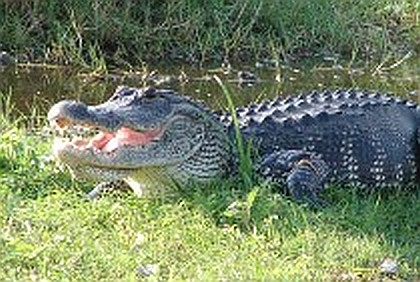Nuisance Alligator Removal Procedure

Dear Residents,
It has come to our attention that there are people who have questions as to when is it appropriate to remove alligators from Harmony. The Harmony Community Development District has put together the following nuisance alligator removal procedure to help give everyone a better understanding.
When is an alligator considered a "nuisance alligator"? Generally, alligators may be considered a nuisance when they are at least four feet in length and pose a threat to people, to their pets, or to property. Alligators less than four feet in length are naturally fearful of people and are not generally capable of eating anything larger than a small turtle. They eat small fish, frogs, and other small animals. They are too small to be a threat to even small pets, and pose no threat to people. They are typically not dangerous to people unless someone attempts to handle them. They are common in Florida, and the mere presence of a small alligator is no cause for concern; even when they turn up in places where people may not expect to see them, such as retention ponds & drainage ditches. Occasionally, alligators of more than four feet in length do become legitimate problems that must be addressed. If an alligator of more than four feet in length approaches people, does not retreat if approached, or is in a location that is not natural, call the Nuisance Alligator Hotline (866-392-4286). Once they have verified your information & the location, they will assign a trapper to come onto the property and remove the alligator.
What happens to nuisance alligators when they are removed by trappers? When a nuisance alligator trapper removes an alligator, that alligator becomes the property of the trapper (except in the case of an alligator bite on a human). In most cases, the alligator is killed and processed for its hide and meat. The sale of the hide and meat is the primary compensation for the nuisance alligator trapper. In a few cases, a nuisance alligator is sold live to an alligator farm, animal exhibit, or zoo. The trapper is usually reimbursed with an amount equivalent to the market value of the alligator. However, the demand for live alligators by these establishments is quite low.
A few reminders:
It is illegal to feed alligators or entice them with food. This will cause the animal to lose its fear of humans, become dangerous, and have to be killed. Because alligators are ubiquitous in Florida, we must assume that every pond has at least one; so it is dangerous for you, your child, or your pet to wade or swim in any of the ponds in Harmony. Alligators are hard to see if they are near the shore basking in the sun. Always be cautious if you are going near water, even in your own back yard.
If you have questions or concerns regarding the removal of alligators, or just want more information about Florida wildlife, please visit the Florida Fish & Wildlife Conservation Commission website, and explore both the Wildlife Habitat and the Alligator Management web pages.
Thank you,
Harmony CDD Board of Supervisors
v18.08